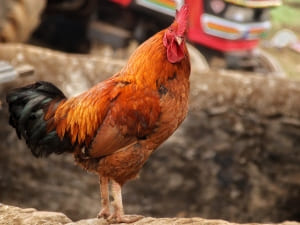
Roosters are mainly known for their early morning crowing and their aggressive behavior. If your rooster’s behavior starts to change you’d be right to be worried. This article looks into why this happens.
Table of Contents
Crowless rooster:
A change in your bird’s appearance or behavior means that there is something going on with your bird, this change in your bird may need to be addressed. This may be what is wrong with your non-crowing rooster:
Illness:
Illnesses can take a toll on anyone, roosters included, if a rooster were to get sick the bird’s body would direct a lot of the bird’s energy towards recovery. This may leave the bird too tired to crow.
In addition, the bird may stop crowing because it is trying to keep attention away from it.
Crowing attracts attention from other birds, if the other flock members start to pay attention to the sick bird, because of all its crowing, and they realize that the bird is sick then they may peck at it.
The rooster will take a break from crowing to keep this from happening.
What to do:
You can help by figuring out what’s wrong with the sick rooster and then medicate the bird.
Keep the sick bird isolated away from the coop while it recovers, this will allow the bird to recover in peace. Make sure that the other birds can still see the rooster as it recovers, this will maintain the pecking order
Also, give the bird its own food and water while it is in recovery.
Bullying:
Bullying can happen to a younger, smaller, or weaker rooster by an older, bigger, and stronger rooster.
Birds who are constantly being bullied may go quiet so as to not attract attention to themselves. This quiet and meek attitude keeps the attention off of them and keeps them from being bullied.
What to do:
You may need to remove the bully bird and put it on a time out, doing this will reorganize the pecking order and may help reduce the bully bird’s aggression.
Put the bully rooster in a crate for a week or longer, some birds come out less aggressive after being isolated for a while. If this doesn’t work then you may have to get rid of the aggressive bird.
Injury:
An injured bird will go silent while it’s hurt. An injury doesn’t have to affect the bird’s throat in order for it to make the bird go silent, any injury can silence the bird.
An injured bird is more vulnerable especially to predators, because of this, the injured bird will not crow so as to not attract attention to itself from predators or from other flock members.
What to do:
You may want to isolate the bird and help the bird recover from its injury. Helping the bird recover may entail bandaging the bird’s injury, splinting the bird’s injury, or placing the bird in a sling if needed.
Giving the bird electrolytes will help the bird recover from the shock of the injury, but don’t offer electrolytes for too many days. Giving the bird a nutrient-dense diet may also help the bird better recover from the injury.
Too young:
Not all male chicks come out crowing, these birds need time to age and mature before they start to crow.
Roosters only start to crow at around 4-5 months old. If your rooster is younger than this then the bird may simply be too young to start crowing. These birds should be crowing fully at around 9 months old.
What to do:
Wait until the bird is of crowing age before starting to worry that your bird isn’t crowing. The bird’s first crow may not be the loudest, and the crow may be hesitant, but if the bird does start to crow when it’s supposed to then it will be fine.
Insecure:
There is a hierarchy among birds with the stronger and bigger birds at the top of the hierarchy and the smaller and weaker birds below. This is the case for roosters as well.
Roosters take turns crowing, the strongest and most dominant birds crow at the end and the weaker birds don’t crow at all. If your bird is not crowing then it may feel insecure about its position in the flock.
What to do:
You as a human can’t do anything to make your bird feel respected. The bird will have to make its way up the hierarchy on its own. Working to rise up in the hierarchy is how the other birds will gain respect for it.
Once the other birds gain respect for the bird the rooster will crow.
Old age:
If your bird is getting older in age the bird may start to crow less and less even going as far as not crowing.
Crowing draws attention to birds, an older bird may not want all this attention on it because it won’t want to be bullied by younger and fitter birds.
What to do:
Growing old is a normal part of a rooster’s life, and so is not crowing because of age. If you know that your rooster is getting old all you can do is help it be comfortable during its last years, months, weeks, and days.
If you enjoyed this article then you may also be interested in other chicken related articles. Here are some articles that you may be interested in: Chicken Shaking Head And Stretching Neck, Rooster Having Seizures, Rooster Stopped Crowing And Mating, Rooster With A Broken Neck, Chicken Seizure


